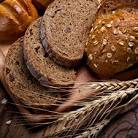One of the most common things I see with clients who are trying to lose weight is a fear and avoidance of carbohydrates in their diet, or something I have dubbed “carbphobia”. I think the popularity of the Atkins and South Beach diets a few years back have stuck in people’s minds. The updated versions of these diets are the Paleo and Wheat Belly Diets.
Take a minute and think about it though…have you or someone you know tried Atkins or another version of a low-carb, high-protein diet? More than likely you or they did lose weight, but did it stay off? What I hear over and over is that yes the weight does come off, but as soon as carbs are reintroduced – which is pretty much inevitable – the weight comes back…plus a few extra pounds. Low-carb, high-protein diets are hard to follow long term and are missing many important nutrients that are key to health and longevity.
I have many clients that really struggle with believing that carbohydrates can be part of a healthy eating plan – even for weight loss - and you may be like them. Say it with me…”Carbohydrates are good for me.” Write it on a post-it and put it on your fridge.
We now know that carbohydrates in general are not the enemy. The most current evidence reveals that it is more important to pay attention to the types of carbohydrates we are eating, and of course portion size is important too. The typical American diet is high in refined carbohydrates – such as white bread (or pseudo wheat, like “Honey Wheat”), sugary drinks (not just soda anymore, but also sports drinks, teas, energy drinks, etc.), packaged snack foods, and baked goods. High intake of these kinds of refined carbs has been linked with an increased risk of type 2 diabetes and heart disease. Diets high in minimally processed carbohydrates, such as whole grains, vegetables, fruits, and legumes, on the other hand, have been linked with a lower risk of these same diseases. They are the body’s main source of energy, help make you feel full and satisfied, help to control blood sugars and insulin levels, promote healthy bowels, and promote the growth of good bacteria in your gut.
When it comes to calories, you get them from 3 sources of macronutrients: carbohydrates, protein, and fat. (Alcohol also provides calories, but we will leave that for another blog.) The recommendations for daily intake for each of these groups varies, but I usually recommend about 45-50% carbohydrates, 20-25% protein, and 25-30% total fat. So if you are eating 1500 calories a day that would be 169-188 grams per day. This is far greater than what is recommended on low-carb, high-protein plans (some recommend as few as 20 grams per day) and is perfectly acceptable no matter what your health goals and better for you overall. For the most benefit and for balance, I recommend clients try to divide this up throughout the day between meals and snacks.
Here are some tips on incorporating more of the healthy carbs:
- Make at least half of your grain servings per day whole grains (about 3 servings daily for the average person). A serving is equal to 1 slice of bread, 1/2 cup rice or pasta, 1 cup breakfast flakes, 1 small tortilla or pancake.
- Read food labels carefully to determine whether grains are refined and if sugars are added. Look for whole grain or whole wheat flour as the first ingredient.
- Choose breads that have a maximum of 100 calories and a minimum of 3 grams of fiber per serving.
- Try to include legumes – beans, lentils, peas, and soy – on your menu at least a few times per week.
- Eat a couple of pieces of whole fruit every day. Try to get a variety in every color – red, blue/purple, green, yellow/oranges.
- Try a new and different whole grain, such as barley, wheat berries, and quinoa.
- Switch to whole-wheat pasta – its fiber will help fill you up.
Remember the mantra, “Carbohydrates are good for me.” Repeat it often. Eating healthier does not have to be about restricting and doing without. Try to change your mindset to a more positive way of thinking about food and a focus on all the benefits good-for-you foods have to offer.


0 Comments